Bruno Brandão
Partial Reasoning in Language Models: Search and Refinement Guided by Uncertainty
Jan 17, 2026Abstract:The use of Large Language Models (LLMs) for reasoning and planning tasks has drawn increasing attention in Artificial Intelligence research. Despite their remarkable progress, these models still exhibit limitations in multi-step inference scenarios, particularly in mathematical and logical reasoning. We introduce PREGU (Partial Reasoning Guided by Uncertainty). PREGU monitors the entropy of the output distribution during autoregressive generation and halts the process whenever entropy exceeds a defined threshold, signaling uncertainty. From that point, a localized search is performed in the latent space to refine the partial reasoning and select the most coherent answer, using the Soft Reasoning method. Experiments conducted with LLaMA-3-8B, Mistral-7B, and Qwen2-7B across four reasoning benchmarks (GSM8K, GSM-Hard, SVAMP, and StrategyQA) showed performance greater than or similar to Soft Reasoning, indicating that entropy can serve as an effective signal to trigger selective refinement during reasoning.
InfoQuest: Evaluating Multi-Turn Dialogue Agents for Open-Ended Conversations with Hidden Context
Feb 17, 2025



Abstract:While large language models excel at following explicit instructions, they often struggle with ambiguous or incomplete user requests, defaulting to verbose, generic responses rather than seeking clarification. We introduce InfoQuest, a multi-turn chat benchmark designed to evaluate how dialogue agents handle hidden context in open-ended user requests. The benchmark presents intentionally ambiguous scenarios that require models to engage in information-seeking dialogue through clarifying questions before providing appropriate responses. Our evaluation of both open and closed-source models reveals that while proprietary models generally perform better, all current assistants struggle with effectively gathering critical information, often requiring multiple turns to infer user intent and frequently defaulting to generic responses without proper clarification. We provide a systematic methodology for generating diverse scenarios and evaluating models' information-seeking capabilities, offering insights into the current limitations of language models in handling ambiguous requests through multi-turn interactions.
Sliding Puzzles Gym: A Scalable Benchmark for State Representation in Visual Reinforcement Learning
Oct 17, 2024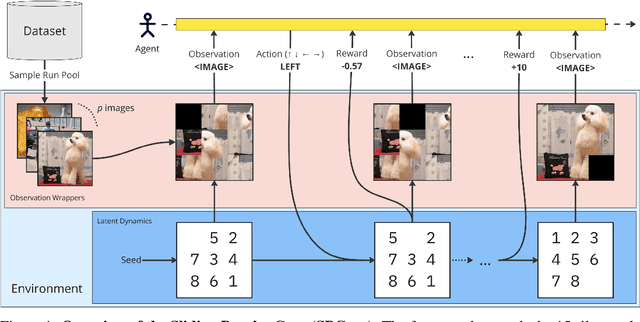
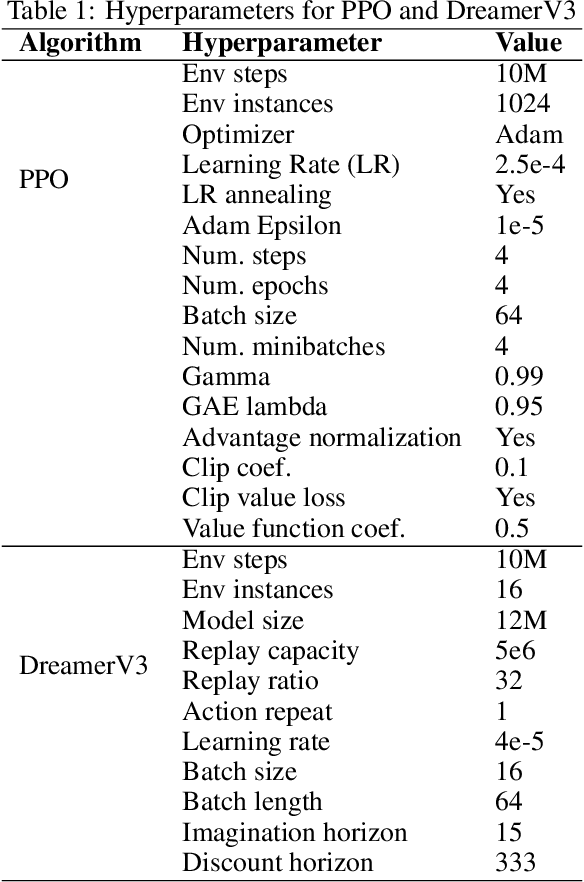


Abstract:Learning effective visual representations is crucial in open-world environments where agents encounter diverse and unstructured observations. This ability enables agents to extract meaningful information from raw sensory inputs, like pixels, which is essential for generalization across different tasks. However, evaluating representation learning separately from policy learning remains a challenge in most reinforcement learning (RL) benchmarks. To address this, we introduce the Sliding Puzzles Gym (SPGym), a benchmark that extends the classic 15-tile puzzle with variable grid sizes and observation spaces, including large real-world image datasets. SPGym allows scaling the representation learning challenge while keeping the latent environment dynamics and algorithmic problem fixed, providing a targeted assessment of agents' ability to form compositional and generalizable state representations. Experiments with both model-free and model-based RL algorithms, with and without explicit representation learning components, show that as the representation challenge scales, SPGym effectively distinguishes agents based on their capabilities. Moreover, SPGym reaches difficulty levels where no tested algorithm consistently excels, highlighting key challenges and opportunities for advancing representation learning for decision-making research.
MARS-Gym: A Gym framework to model, train, and evaluate Recommender Systems for Marketplaces
Sep 30, 2020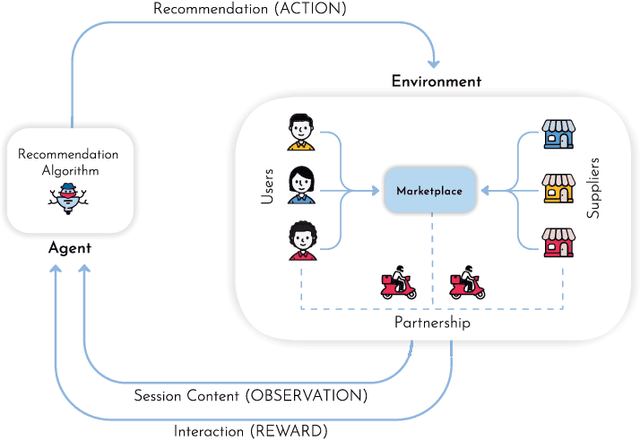

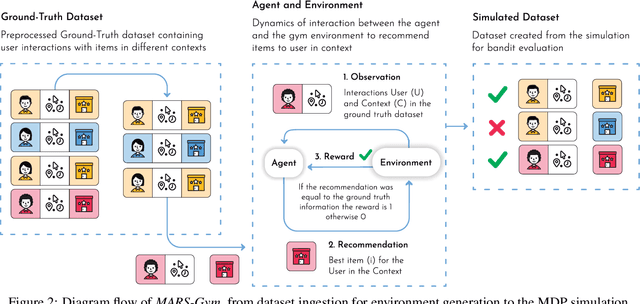
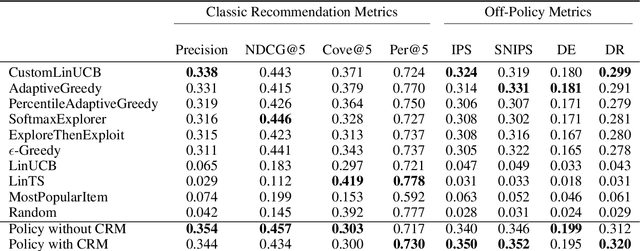
Abstract:Recommender Systems are especially challenging for marketplaces since they must maximize user satisfaction while maintaining the healthiness and fairness of such ecosystems. In this context, we observed a lack of resources to design, train, and evaluate agents that learn by interacting within these environments. For this matter, we propose MARS-Gym, an open-source framework to empower researchers and engineers to quickly build and evaluate Reinforcement Learning agents for recommendations in marketplaces. MARS-Gym addresses the whole development pipeline: data processing, model design and optimization, and multi-sided evaluation. We also provide the implementation of a diverse set of baseline agents, with a metrics-driven analysis of them in the Trivago marketplace dataset, to illustrate how to conduct a holistic assessment using the available metrics of recommendation, off-policy estimation, and fairness. With MARS-Gym, we expect to bridge the gap between academic research and production systems, as well as to facilitate the design of new algorithms and applications.
 Add to Chrome
Add to Chrome Add to Firefox
Add to Firefox Add to Edge
Add to Edge